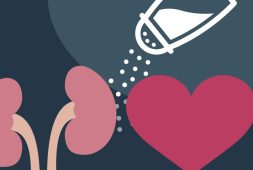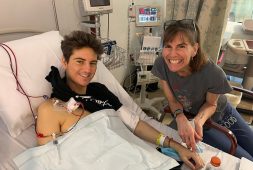
Numerous women encounter sleep-related challenges both during and after menopause. A recent investigation establishes a correlation between insufficient sleep and alterations in blood sugar levels.
The research, published on November 13 in the journal Diabetes Care, highlights that women who consistently experience insufficient sleep, particularly those who have undergone menopause, may face an elevated risk of developing type 2 diabetes. Marie-Pierre St-Onge, PhD, an associate professor of nutritional medicine at the Columbia University Institute of Human Nutrition in New York City and coauthor of the study, emphasized in a press release that these findings suggest a direct impact of inadequate sleep on insulin production and metabolism. This underscores the significance of recognizing the potential implications of sleep deprivation, especially for women in the postmenopausal stage, in the context of their metabolic health and susceptibility to type 2 diabetes.
“The bottom line is that getting adequate sleep each night may lead to better blood sugar control and reduced risk for type 2 diabetes, especially among postmenopausal women,” Dr. St-Onge stated.
Women More Likely to Report Lack of Sleep
Earlier research on the correlation between insufficient sleep and the risk of diabetes predominantly concentrated on men, typically examining brief yet intense episodes of sleep deprivation. The authors underscore the significance of investigating the specific effects of chronic sleep disturbances on women’s health for several reasons.
“Throughout their lifespan, women face many changes in their sleep habits due to childbearing, child-rearing, and menopause — and more women than men have the perception they aren’t getting enough sleep,” St-Onge said.
Most U.S. Adults Don’t Sleep Enough
A March 2023 publication from Brigham and Women’s Hospital revealed that the majority of adults are averaging approximately six hours and 27 minutes of sleep per night, with nearly 30 percent sleeping less than six hours. The recommended nightly sleep duration for adults is at least seven hours.
Consistently insufficient sleep is associated with various chronic health issues such as heart disease, kidney disease, high blood pressure, stroke, obesity, and depression, as reported by the National Heart, Lung, and Blood Institute.
Less Sleep Affected Sugar Processing
The recent research included 38 women, aged 20 to 75, with healthy sleep habits (averaging seven to nine hours per night) and normal fasting blood sugar levels. Despite their good sleep and metabolic health, all participants had either existing heart disease or heightened risks due to factors like overweight or obesity, a family history of type 2 diabetes, high cholesterol, triglycerides, or a combination of these elements.
To establish a baseline for their regular sleep patterns, the participants utilized wrist sensors and maintained sleep logs for a duration of two weeks. Subsequently, the women underwent two six-week study phases in a random order: one in which they continued their usual healthy sleep routines, and another where their sleep was intentionally restricted. A six-week break was incorporated between these phases for recalibration.
During the phase of adequate sleep, participants adhered to their typical bed and wake times, achieving an average of 7.5 hours of sleep per night.
In the sleep-restricted phase, participants were instructed to delay their usual bedtime by 1.5 hours each night while maintaining the same waking time. On average, during this phase, the women slept approximately 6.2 hours per night—roughly equivalent to the average nightly sleep duration for the typical American, as noted by the authors.
At the commencement and conclusion of each study phase, participants underwent an oral glucose tolerance test to assess blood sugar and insulin levels, coupled with an MRI to examine body fat levels.
Relationship Between Blood Sugar, Insulin, and Diabetes
Insulin plays a crucial role in the regulation of sugar, or glucose, within the body. When an individual develops resistance to insulin, their body’s efficiency in processing glucose diminishes, consequently elevating the risk of prediabetes or type 2 diabetes, as explained by the authors.
To assess the likelihood of type 2 diabetes, healthcare professionals often employ an oral glucose tolerance test (OGTT) to measure the body’s response to glucose, a method endorsed by the Mayo Clinic. This test is instrumental in identifying irregularities in how the body manages glucose post-meal consumption.
In instances where sleep was restricted, there was an average increase in insulin resistance by 14.8 percent, with postmenopausal women experiencing a more substantial rise of up to 20.1 percent. Essentially, women with inadequate sleep required higher insulin levels to normalize blood sugar.
In premenopausal women subjected to sleep restriction, fasting insulin levels showed an increase. On the other hand, postmenopausal women exhibited elevated levels in both fasting insulin and fasting glucose. This underscores the impact of insufficient sleep on insulin dynamics and blood sugar levels, particularly in women of different menopausal statuses.
“Over a longer period of time, ongoing stress on insulin-producing cells could cause them to fail, eventually leading to type 2 diabetes. If that’s sustained over time, it is possible that prolonged insufficient sleep among individuals with prediabetes could accelerate the progression to type 2 diabetes,” St-Onge said in the release.
The scientists also examined whether the weight gain observed in the women throughout the study might have contributed to the observed increase. This is because individuals often consume more calories when sleep-deprived. Nevertheless, the researchers discovered that the impact on insulin resistance was mostly unaffected by fluctuations in body weight. Furthermore, when the women resumed their usual sleep duration of seven to nine hours per night, their insulin and glucose levels reverted to normal.
Insulin Resistance Linked to Higher Risk for Hypertension, Heart Disease and Certain Cancers
Taking the authors’ findings at face value suggests a potential link between sleep problems related to menopause and an increased risk of diabetes, according to Dr. Sun Kim, an associate professor and endocrinologist at Stanford Medicine in California.
Nevertheless, Dr. Kim emphasizes that insulin resistance, although a factor, should not be equated with prediabetes or diabetes. Prediabetes diagnosis requires the presence of insulin resistance, and the Cleveland Clinic notes that persistent insulin resistance can ultimately progress to prediabetes or type 2 diabetes.
“Individuals with insulin resistance tend to be at higher risk for prediabetes/diabetes and other diseases including hypertension, dyslipidemia [high cholesterol], cardiovascular disease, and some forms of cancer,” she said.
However, in this research, insulin levels were not directly assessed during the OGTT. Instead, a surrogate marker was employed, and the results presented here do not conclusively demonstrate that insufficient sleep led to an increase in insulin resistance, as clarified by Kim.
The Reason Behind Why the Body Responds Less Effectively to Glucose
Researchers still don’t completely know what and why sleeping less regularly could cause the change. “It’s possible that shortening sleep alters rhythmic processes in the body,” St-Onge said.
Kim is not sure that this study proved that short span of time had worsened insulin resistance, but she does have a potential theory if this is, at all, true. “Short sleep duration may worsen insulin resistance through multiple pathways, including increasing ‘stress,’ or cortisol, inflammation, and sympathetic nervous system [response],” which is also referred to as flight-or-fight reactions, she said. There may have been alterations in fat distribution or fat function, although this study did not see the big differences in body fat levels, she added.
Methods to Try
Sleep troubles frequently affect women during menopause. According to the North American Menopause Society, hormone therapy might be beneficial based on individual medical history and lifestyle.
The University of Maryland Medical System suggests the following lifestyle adjustments to address sleep issues:
- Steer clear of caffeine and spicy foods.
- Establish a consistent bedtime routine that involves a calming activity before going to bed.
- Avoid consuming large meals right before bedtime.
- Engage in daily exercise, ensuring it’s not too close to bedtime.
- Maintain a consistent sleep schedule by going to bed and waking up at the same time daily.
- If you smoke, consider quitting.
- Limit alcohol intake.
- Ensure your sleeping environment is cool and quiet.
- Incorporate meditation, deep breathing, or other mindfulness techniques.
- Minimize screen time before bedtime, and ideally, keep phones and tablets out of the bedroom.



